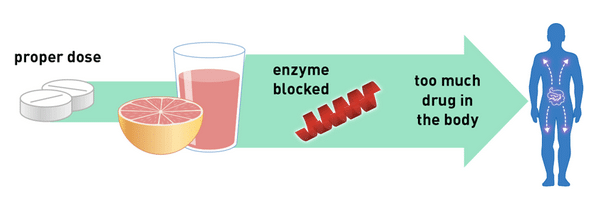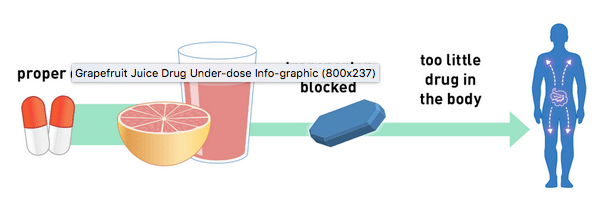The interaction between grapefruit juice and certain medications can increase your risk of side effects, according to the U.S. Food and Drug Administration (FDA).
The FDA is now requiring warning labels on certain prescription drugs against drinking grapefruit juice or eating grapefruit due to the risk.
In most cases, grapefruit juice will cause your body to metabolize medications faster than normal, according to Dr. Shiew Mei Huang:
The juice lets more of the drug enter the blood. When there is too much drug in the blood, you may have more side effects.”
In other cases, grapefruit juice causes less of the medication to get into the body, decreasing how well it works. This is what happens with certain seasonal allergy medications, such as Allegra (fexofenadine).
Examples of medications that can interact with grapefruit juice include:
- Cholesterol-lowering statins, such as Lipitor (atorvastatin) and Zocor (simvastatin)
- High blood pressure drugs, such as Procardia and Adalat CC (both nifedipine)
- Anti-anxiety drugs, such as buspirone
- Corticosteroids for the treatment of Crohn’s disease or ulcerative colitis, such as Entocort EC and Uceris (both budesonide)
- Abnormal heart rhythm drugs, such as Pacerone and Nexterone (both amiodarone)
- Antihistamines, such as Allegra (fexofenadine)
Not all of the drugs in the categories listed above interact with grapefruit juice, and the severity of the interaction depends on how much grapefruit juice you drink and your individual risk-factors.
Grapefruit juice may also affect people differently — even when they take the same drug. This is why you should read the “Drug Facts” label on over-the-counter drugs and ask your doctor if you can drink grapefruit juice while taking any prescription medication.
If your medication interacts with grapefruit juice, you should also avoid eating Seville oranges (often used to make orange marmalade), pomelos, and tangelos (a cross between tangerines and grapefruit). These other fruits may have similar side effects as grapefruit juice.

Some drugs, like statins used to lower cholesterol, are broken down by enzymes. Grapefruit juice can block the action of these enzymes, increasing the amount of drug in the body and may cause more side effects.

